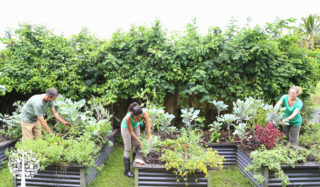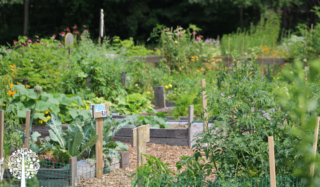Community Gardens Are A Safe And Happy Space For Everyone
In March 2020, an unprecedented shock wave reverberated worldwide as a virus grabbed hold of life as we knew it. As the manager of a community garden, I had to send everyone home and lock the gates. My brilliant and eclectic group of volunteer gardeners were suddenly full of fear and confusion, and I initially wondered how they would cope.
Anxious and Alone
The social isolation resulting from lockdowns and restrictive measures raised the roof on anxiety and depression levels. People accustomed to being social with friends and family were told to stay home. This meant being utterly alone with negative thoughts and no apparent end in sight for many. The decline in mental health was tangible and has continued to be over the past two years. People have lost confidence and purpose as life took an unexpected turn.

As the realisation of the enormity of the global pandemic hit, the dual priorities of making sure the garden and its gardeners were looked after enabled me to reopen our community space. Set in a town in NW England, an area of high socio-economic deprivation, our community garden brings opportunities and escapes to people of all ages and backgrounds in a region where resources are limited. We worked on reduced hours with fewer individuals, but we got cracking anyway.
Mental Health Break
The natural world initially prospered in those strange times. Fewer vehicles on the roads and fewer planes in the skies. The air felt cleaner, and birdsong was more audible. Weeds shot up everywhere, and we had plenty to do throughout the growing season. And how people needed something positive to do to combat the fear and clear brains dizzy with confusion and anxieties. Our community garden gave us the chance to be in touch with others, rebuild assurance and, very importantly, relax within the safety of green space.
Gardening’s mental health benefits are abundant. Spending time outdoors, whatever the weather, is liberating and can decrease feelings of confinement. Engaging in uncomplicated tasks such as seed sowing, planting, shifting horse manure or turning compost enables one to switch off and do something mindlessly productive. There is the simple pleasure of helping something grow. It teaches patience, and all stages of the process can be meditative. In a community garden, the bounty is shared amongst the group that has tended to and harvested the crop. As a result, people become more self-sufficient and more resilient. Beetroot and kale on toast are delicious additions to our daily menus.
The Physical Benefits

My referrals come from agencies that work with people who are overweight, mentally ill, or have long-term injuries or illnesses. People want to lose weight, become fitter, and gain self-esteem, but the prospect of a gym or an exercise class is unappealing. And so they turn to the garden and the outdoors where they won’t be judged or questioned. Plants are good for that! A garden can easily cover an acre, so inadvertently, a gardener may walk a few thousand steps during a session. Gentle weight-bearing exercise (moving a half-filled wheelbarrow, forking over a raised bed) and using different muscles (squatting to dig or pull weeds out) develop strength and boost overall physical health, sparking positive hormones into action.
Happy Hormones
Endorphins, our ‘feel good’ neurotransmitters, are released with exercise and when we laugh. Our garden bursts with laughter as people let go of trauma, sadness, grief and isolation. A quiet corner serves as a meditative space, another chance for endorphins to gently course through the body and ease the mind.
Dopamine releases as we take pleasure in something, like the first red tomato or a bee sucking nectar from honeysuckle. The satisfaction with achieving something also releases these happy hormones. Physical labour, such as digging, sawing, banging nails with a hammer to fix a bed edge, or shifting horse muck relieves stress and pent-up emotions and releases serotonin. Being outdoors in the light, be it full sunshine or hazy winter mornings, also allows our happy hormones to do their jobs. The physical and the mental work together in harmony.
Gardening, especially in a community setting, allows people to find a renewed sense of purpose. Opening the gates and welcoming individuals back to the garden is essential now. The act of growing is a joy, and it is lovely to see how many people are realising that gardening with others is one of the best ways to counter the post-traumatic stress that has affected our world. Together, we can plant some seeds of hope and look to brighter days ahead.




